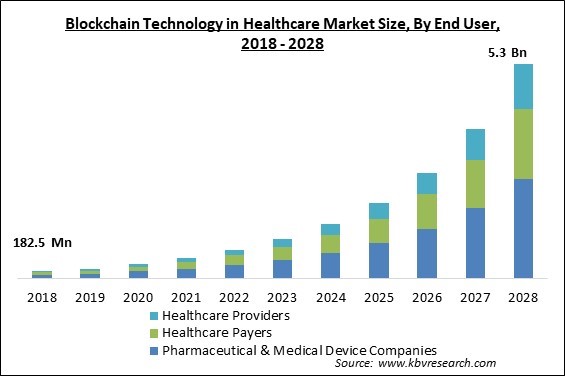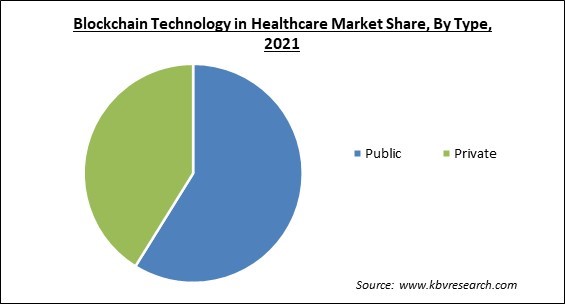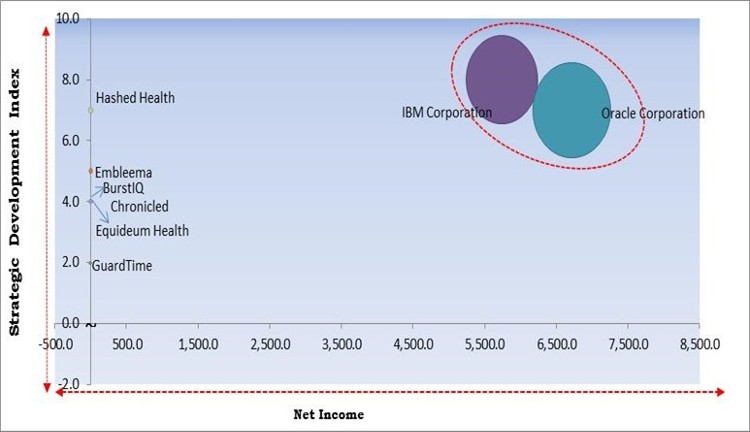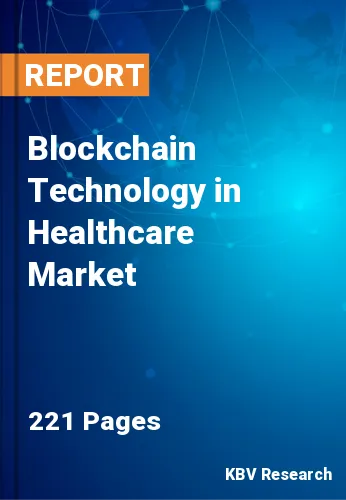The Global Blockchain Technology in Healthcare Market size is expected to reach $5.3 billion by 2028, rising at a market growth of 39.9% CAGR during the forecast period.
A blockchain refers to a shared distributed database or ledger between computer network nodes. Also, a blockchain functions as a digital database for the storage of data. The blockchain is made up of blocks with particular storage capacities that, once filled, are closed and linked to the block which passed before them to form a data chain. When the chain is complete, a new block is created from each bit of information that follows the just block and added to the chain.

A blockchain network is utilized in the healthcare industry to collect and access patient data across hospitals, diagnostic labs, pharmaceutical companies, and physicians. It can improve the effectiveness, security, and transparency of medical data interchange throughout the healthcare system. Using this technology, medical institutions could gain knowledge and enhance the evaluation of patient data. One of the key factors influencing the deployment of blockchain technology in the healthcare sector is the surge in data breaches.
The adoption of blockchain technology inside the healthcare system has increased the demand for blockchain technology in the sector. It may result in significant annual cost savings in areas such as IT, personnel, operations, and support function expenditures as well as reductions in fraud and the sale of fake goods. Complete protection from fraudulent pharmaceuticals may be offered by incorporating blockchain with supply chain management, making it the most popular blockchain technology in the healthcare industry.
The healthcare sector is dealing with a very serious issue: pharmaceutical counterfeiting. The lack of transparency in pharmaceutical supply chains makes it easy for fraud and manipulation to occur. Since blockchain technology enables system clarity and data integrity, it gives ideal solutions to combat pharmaceutical counterfeiting. It provides total, end-to-end supply chain transparency.
The lockout caused delays in the production and delivery of critical medical supplies. Limited access to medical treatment, a staffing deficit in the healthcare industry, and an increase in COVID-19-related hospitalization are a few more variables that have an impact on the market. The coronavirus outbreak hastened the adoption of cutting-edge technologies in the healthcare sector, like blockchain. Blockchain technology has been utilized by healthcare facilities across a number of countries, which has improved effective resource & operation planning. Several market participants are creating a tracking system based on blockchain to halt the spread of incorrect information.
Regardless of what an industry stands for, miscommunication is a flaw that has a detrimental effect on it. Since people's lives are on the line, it is especially important to guarantee smooth and effective communication in the sensitive healthcare industry. Communication breakdown among healthcare professionals or between patients & providers could be very expensive and even dangerous to the health of the patient. The majority of miscommunications are caused by incomplete or inaccurate medical data, as updating them takes a long time. Blockchain technology might be a useful remedy for this issue. Decentralized blockchain solutions exist. As a result, the information is kept on various network nodes rather than just one database.
Medical data storage and security requirements have increased, which can be beneficial for medical staff, patients, and healthcare facilities. Medical data may be kept secure thanks to blockchain technology's cross-checking, encryption, and decentralization, which stimulates the market's growth. The digitization of the healthcare system and related business sectors is being prioritized by the governments of various nations because it has the potential to boost patient participation, improve health outcomes, and make better forecasts, among other things.
Regarding how various institutions manage records, healthcare physician providers & insurance payers vary widely. It would be very challenging to get all of these organizations to utilize blockchain technology without a streamlined method, like single payer. However, the effectiveness of the entire system is diminished if any are unwilling to adopt it. Therefore, it is a tough ask to convince them to switch from paper records to electronic healthcare records (EHR) using blockchain. For instance, doctors frequently leave questions blank since doing so is mandated by technology.
Based on type, the blockchain technology in healthcare market is segmented into Public and Private. The private segment procured a significant revenue share in the blockchain technology in healthcare market in 2021. It is due to the rising safety of data and effectiveness. One example of the private network is Hyperledger Fabric from the Linux foundation. They provide great security, quick transactions, and privacy. They are thus created and utilized for specific corporate requirements.

On the basis of application, the blockchain technology in healthcare market is divided into Supply Chain Management, Data Exchange & Interoperability, Claims Adjudication & Billing, and Others. The supply chain management segment recorded the maximum revenue share in the blockchain technology in healthcare market in 2021. Applications for blockchain assist maintain data integrity. Pharmaceutical firms can improve interoperability with Internet of Things (IoT) devices due to the technology.
By end-user, the blockchain technology in healthcare market is fragmented into Pharmaceutical and Medical Device Companies, Healthcare Payers and Healthcare Providers. The pharmaceutical and medical device companies segment registered the highest revenue share in the blockchain technology in healthcare market in 2021. The growing use of technology for critical tasks like ensuring the legitimacy of a drug being returned, preventing counterfeiting, adhering to the pharmaceutical supply chain, ensuring transparency and traceability in clinical trials, and enhancing the accuracy and dependability of clinical trial data is also predicted to contribute to segment growth.
| Report Attribute | Details |
|---|---|
| Market size value in 2021 | USD 502.7 Million |
| Market size forecast in 2028 | USD 5.3 Billion |
| Base Year | 2021 |
| Historical Period | 2018 to 2020 |
| Forecast Period | 2022 to 2028 |
| Revenue Growth Rate | CAGR of 39.9% from 2022 to 2028 |
| Number of Pages | 221 |
| Number of Tables | 352 |
| Report coverage | Market Trends, Revenue Estimation and Forecast, Segmentation Analysis, Regional and Country Breakdown, Competitive Landscape, Companies Strategic Developments, Company Profiling |
| Segments covered | Type, End User, Application, Region |
| Country scope | US, Canada, Mexico, Germany, UK, France, Russia, Spain, Italy, China, Japan, India, South Korea, Singapore, Malaysia, Brazil, Argentina, UAE, Saudi Arabia, South Africa, Nigeria |
| Growth Drivers |
|
| Restraints |
|
Region-wise, the blockchain technology in healthcare market is analyzed across North America, Europe, Asia Pacific, and LAMEA. North America emerged as the leading region in the blockchain technology in healthcare market with the largest revenue share in 2021. This is due to developments in blockchain technology, the combination of cutting-edge hardware and software, the existence of important actors, and the region's strong infrastructure.
Free Valuable Insights: Global Blockchain Technology in Healthcare Market size to reach USD 5.3 Billion by 2028

The major strategies followed by the market participants are Product Launches. Based on the Analysis presented in the Cardinal matrix; IBM Corporation and Oracle Corporation are the forerunners in the Blockchain Technology in Healthcare Market. Companies such as Hashed Health, Embleema, are some of the key innovators in Blockchain Technology in Healthcare Market.
The market research report covers the analysis of key stake holders of the market. Key companies profiled in the report include IBM Corporation, Oracle Corporation, Avaneer Health, Inc., BurstIQ, LLC, Chronicled, Embleema, Equideum Health (ConsenSys Mesh), Farmatrust, GuardTime, and Hashed Health.
By End User
By Type
By Application
By Geography
The Blockchain Technology in Healthcare Market size is projected to reach USD 5.3 billion by 2028.
Increasing Need For The Improved Communication Between Healthcare Provider And Patients are driving the market in coming years, however, Complexities Faced By The Healthcare Companies During The Implementation restraints the growth of the market.
IBM Corporation, Oracle Corporation, Avaneer Health, Inc., BurstIQ, LLC, Chronicled, Embleema, Equideum Health (ConsenSys Mesh), Farmatrust, GuardTime, and Hashed Health.
The expected CAGR of the Blockchain Technology in Healthcare Market is 39.9% from 2022 to 2028.
The Public segment acquired maximum revenue share in the Global Blockchain Technology in Healthcare Market by Type in 2021 thereby, achieving a market value of $3.1 billion by 2028.
The North America market dominated the Global Blockchain Technology in Healthcare Market by Region in 2021, and would continue to be a dominant market till 2028; thereby, achieving a market value of $2.0 billion by 2028.
Our team of dedicated experts can provide you with attractive expansion opportunities for your business.

